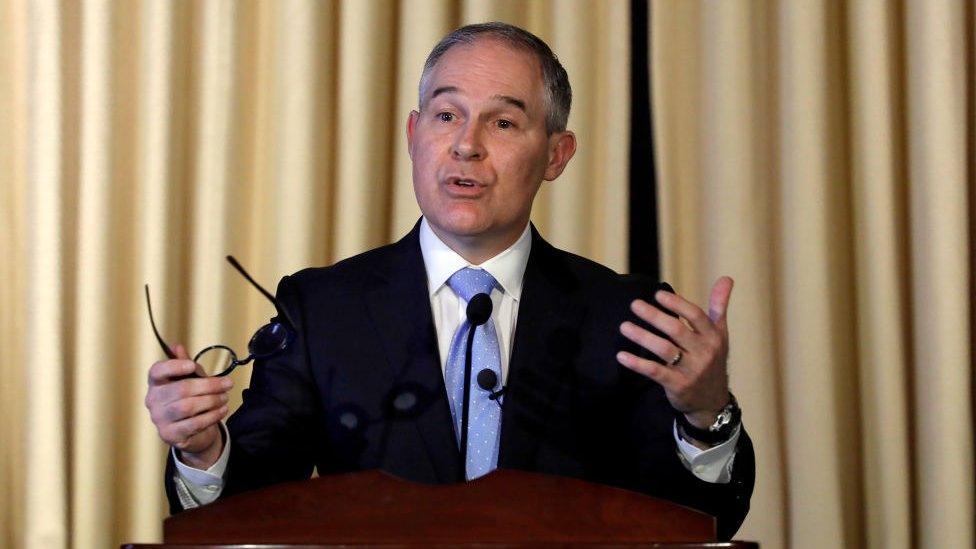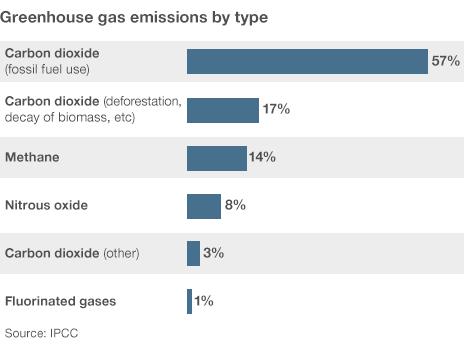EPA chief doubts carbon dioxide's role in global warming
- Published

US Environmental Protection Agency (EPA) chief Scott Pruitt has said he "would not agree" carbon dioxide is a primary contributor to global warming.
He told CNBC that measuring human impact on the climate was "very challenging" and there was "tremendous disagreement" about the issue.
Mr Pruitt instead insisted that officials needed "to continue the debate" on the issue.
His remarks contradict his own agency's findings on greenhouse gas emissions.
The EPA's website, external notes that carbon dioxide is the "primary greenhouse gas that is contributing to recent climate change".
Data released in January by NASA and the US National Oceanic and Atmospheric Administration said the planet's rising temperature has been "driven largely by increased carbon dioxide and other human-made emissions in the atmosphere".
The two US agencies added that the earth's 2016 temperatures were the warmest ever.

Analysis - Matt McGrath, BBC News, Environment correspondent
Scott Pruitt's comments have inflamed the opinions of many scientists and green campaigners who have long been suspicious of his perspectives on the causes of global warming.
However, US experts say that Mr Pruitt's statement is not altogether a surprise.
Prof Katharine Hayhoe, from Texas Tech University, told BBC News she felt "gloomily vindicated".
"It's not a surprise to anyone who's been following what the Republicans have been saying publicly at the federal level," she said.
Others have pointed to the apparent contradiction between Mr Pruitt's interview and his statements to Congress during his confirmation hearing in which he said that he believed the head of the EPA "has an important role when it comes to regulating carbon dioxide".
Mr Pruitt's views on CO2 are unlikely to have much direct impact on scientists in the field, as the EPA itself does not fund much climate research, but the signal it sends on the integrity of the scientific method worries many.
In the international field, it puts the EPA at odds with almost every other environmental protection institution, in almost every country.
And according to Prof Hayhoe, there will be other more direct effects of the anti-CO2 stance the new director is signalling.
"Budget cuts to the EPA will potentially cut valuable and irreplaceable monitoring programmes, and these will have very real impacts for people's health."

In fact, there is consensus among the majority of scientists in the field that carbon emissions from human activities are a key driver of rising temperatures and that the impact of climate change will be severe.
Mr Pruitt, 48, who was sworn in last month, is considered one of President Donald Trump's most controversial appointments due to his ties to the fossil fuel industry.
The former Oklahoma attorney general also spent years legally challenging the reach of the organisation he now heads.
During his confirmation hearing in January, Mr Pruitt did say he believed humans had contributed to climate change, though he was not sure how much.
Matt McGrath explains why we should care about climate change
Environmental groups were swift to criticise Mr Pruitt's latest comments.
"The arsonist is now in charge of the fire department, and he seems happy to let the climate crisis burn out of control," said Sierra Club executive director Michael Brune.
Democratic Senator Brian Schatz said Mr Pruitt's remarks suggested he is a "climate denier".
"Anyone who denies over a century's worth of established science and basic facts is unqualified to be the administrator of the EPA," Mr Schatz said in a statement.
Mr Trump tweeted in 2012 that global warming was a "hoax", but he said last November "I think there is some connectivity" between humans and the changing climate.

